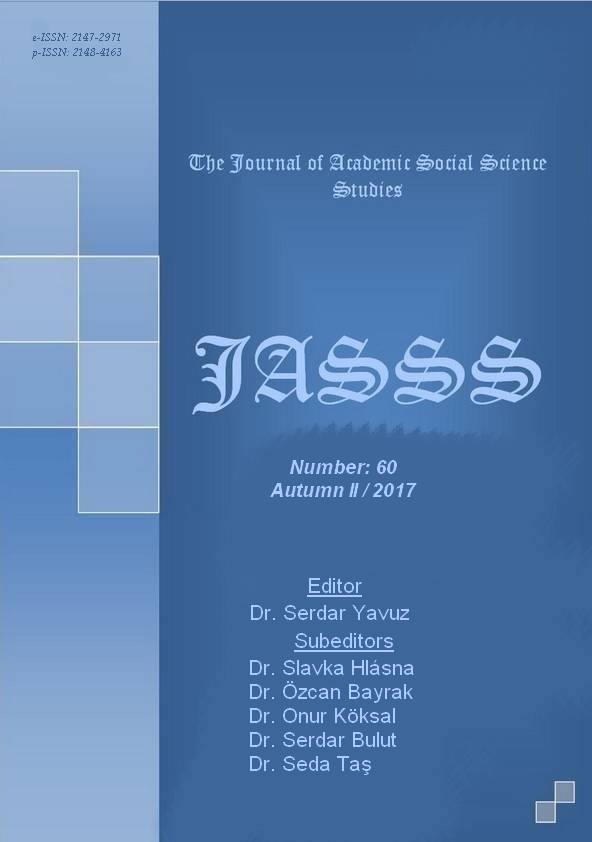ORTAOKUL ÖĞRENCİLERİNİN FEN DERSİNE YÖNELİK TUTUM DÜZEYLERİNİN BAZI DEĞİŞKENLER AÇISINDAN İNCELENMESİ - 1
Author :
Abstract
Bu araştırma ortaokul öğrencilerinin fen dersine yönelik tutum düzeylerini incelemek, tutum ile başarı arasındaki ilişkiyi belirlemek, sınıf düzeyi, cinsiyet, derse katılım, fen dersini sevme, anne eğitim düzeyi, baba eğitim düzeyi, anne çalışma durumu, aile gelir düzeyi, deney yapma sıklığı değişkenlerinin fen dersine yönelik tutum düzeyleri üzerindeki etkisini araştırarak, tutum düzeylerinin geliştirilmesine yönelik öneri sunmak amacıyla gerçekleştirilmiştir. Araştırmada tarama modeli kullanılmıştır. Tarama araştırmasının da kesitsel türü uygulanmıştır. Araştırma 2015-2016 öğretim yılı II. döneminde Ankara ilindeki on iki devlet ortaokulunun 5., 6., 7. ve 8. sınıflarında öğrenim gören 1780 öğrenci üzerinde yürütülmüştür. Veri toplama aracı olarak “Fen Dersine Yönelik Tutum Ölçeği” kullanılmıştır. Veriler Bağımsız Gruplar İçin t-Testi, İlişkisiz Örneklemler İçin Tek Faktörlü Varyans Analizi ve Pearson Korelasyon Katsayısı ile çözümlenmiştir. Araştırmanın sonucunda ortaokul öğrencilerinin fen dersine yönelik tutum düzeyleri üzerinde cinsiyet, anne eğitim düzeyi, baba eğitim düzeyi, anne çalışma durumu ve aile gelir düzeyi değişkenlerinin belirleyici bir etkisi olmadığı görülmüştür. Fen dersine yönelik tutum ile fen bilimleri dersi başarı puanı arasında pozitif yönde, anlamlı ve yüksek bir ilişki olduğu saptanmıştır. Buna ilaveten fen dersini sevme düzeyi, deney - etkinlik yapma sıklığı, derse katılım düzeyi değişkenlerinin fen dersine yönelik tutum üzerinde anlamlı bir etkisi olduğu görülmüştür. Ayrıca ortaokul öğrencilerinin 5. sınıftan 8. sınıfa doğru fen dersine yönelik tutum düzeylerinde anlamlı bir azalma olduğu belirlenmiştir.
Keywords
Abstract
This study was conducted to investigate into attitudes towards science course levels of 5th, 6th, 7th and 8th grade students from secondary school; to determine the correlation between attitudes and academic success; to investigate into influence of variables of gender, class level, success at science course, mother education, father education, mother working situation, family income level, liking science course and course attendance level, frequency of experiment–activity on attitude level towards science course so as to draw a suggestion for improving attitudes level in this course. A survey model is used in the research. It employs cross-sectional survey model. The research was conducted on 1780 students from the twelve public secondary schools in Ankara City along the second term in the academic year of 2015-2016. “The Attitudes towards Science Course Scale” was used as data collection tool. Independent Samples t-Test, One-Way ANOVA, Pearson Correlation Coefficient were used to analyze for the data. As a result of the study, it was determined that gender, mother education, father education, mother working situation and family income level variables were not statistically significant on attitude levels. A positive, statistically significant and high correlation was determined between the motivation and success. Furthermore, it was concluded that frequency of experiment–activity, liking science course and course attendance level variables were statistically significant on attitude level. In addition it was concluded that attitude decreases from 5th to 8th grade significantly.





